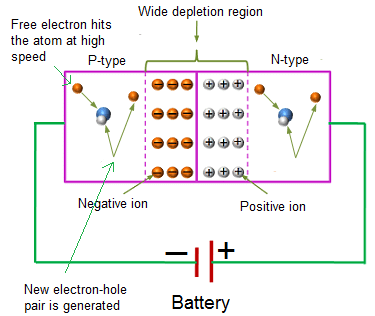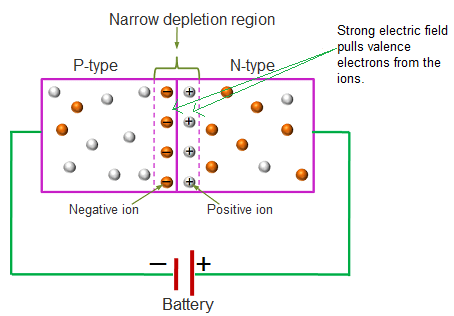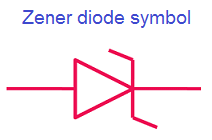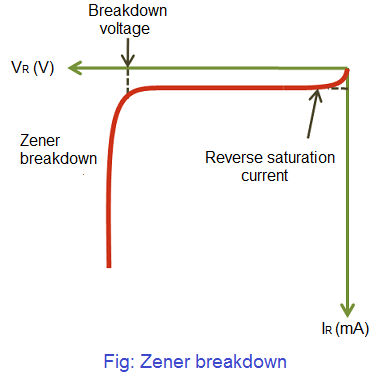Zener Diode | Physics Class 12 - NEET PDF Download
Zener diode
A normal p-n junction diode allows electric current only in forward biased condition. When forward biased voltage is applied to the p-n junction diode, it allows large amount of electric current and blocks only a small amount of electric current. Hence, a forward biased p-n junction diode offer only a small resistance to the electric current.
When reverse biased voltage is applied to the p-n junction diode, it blocks large amount of electric current and allows only a small amount of electric current. Hence, a reverse biased p-n junction diode offer large resistance to the electric current.
If reverse biased voltage applied to the p-n junction diode is highly increased, a sudden rise in current occurs. At this point, a small increase in voltage will rapidly increases the electric current. This sudden rise in electric current causes a junction breakdown called zener or avalanche breakdown. The voltage at which zener breakdown occurs is called zener voltage and the sudden increase in current is called zener current.
A normal p-n junction diode does not operate in breakdown region because the excess current permanently damages the diode. Normal p-n junction diodes are not designed to operate in reverse breakdown region. Therefore, a normal p-n junction diode does not operate in reverse breakdown region.
What is zener diode?
A zener diode is a special type of device designed to operate in the zener breakdown region. Zener diodes acts like normal p-n junction diodes under forward biased condition. When forward biased voltage is applied to the zener diode it allows large amount of electric current and blocks only a small amount of electric current.
Zener diode is heavily doped than the normal p-n junction diode. Hence, it has very thindepletion region. Therefore, zener diodes allow more electric current than the normal p-n junction diodes.
Zener diode allows electric current in forward direction like a normal diode but also allows electric current in the reverse direction if the applied reverse voltage is greater than the zener voltage. Zener diode is always connected in reverse direction because it is specifically designed to work in reverse direction.
Zener diode definition
A zener diode is a p-n junction semiconductor device designed to operate in the reverse breakdown region. The breakdown voltage of a zener diode is carefully set by controlling the doping level during manufacture.
The name zener diode was named after the American physicist Clarance Melvin Zener who discovered the zener effect. Zener diodes are the basic building blocks of electronic circuits. They are widely used in all kinds of electronic equipments. Zener diodes are mainly used to protect electronic circuits from over voltage.
Breakdown in zener diode
There are two types of reverse breakdown regions in a zener diode: avalanche breakdown and zener breakdown.
Avalanche breakdown
The avalanche breakdown occurs in both normal diodes and zener diodes at high reverse voltage. When high reverse voltage is applied to the p-n junction diode, the free electrons(minority carriers) gains large amount of energy and accelerated to greater velocities.

The free electrons moving at high speed will collides with the atoms and knock off more electrons. These electrons are again accelerated and collide with other atoms. Because of this continuous collision with the atoms, a large number of free electrons are generated. As a result, electric current in the diode increases rapidly. This sudden increase in electric current may permanently destroys the normal diode. However, avalanche diodes may not be destroyed because they are carefully designed to operate in avalanche breakdown region. Avalanche breakdown occurs in zener diodes with zener voltage (Vz) greater than 6V.
Zener breakdown
The zener breakdown occurs in heavily doped p-n junction diodes because of their narrow depletion region. When reverse biased voltage applied to the diode is increased, the narrow depletion region generates strong electric field.
When reverse biased voltage applied to the diode reaches close to zener voltage, the electric field in the depletion region is strong enough to pull electrons from their valence band. The valence electrons which gains sufficient energy from the strong electric field of depletion region will breaks bonding with the parent atom. The valance electrons which break bonding with parent atom will become free electrons. This free electrons carry electric current from one place to another place. At zener breakdown region, a small increase in voltage will rapidly increases the electric current.
- Zener breakdown occurs at low reverse voltage whereas avalanche breakdown occurs at high reverse voltage.
- Zener breakdown occurs in zener diodes because they have very thin depletion region.
- Breakdown region is the normal operating region for a zener diode.
- Zener breakdown occurs in zener diodes with zener voltage (Vz) less than 6V.
Symbol of zener diode
The symbol of zener diode is shown in below figure. Zener diode consists of two terminals: cathode and anode.
In zener diode, electric current flows from both anode to cathode and cathode to anode.
The symbol of zener diode is similar to the normal p-n junction diode, but with bend edges on the vertical bar.
VI characteristics of zener diode
The VI characteristics of a zener diode is shown in the below figure. When forward biased voltage is applied to the zener diode, it works like a normal diode. However, when reverse biased voltage is applied to the zener diode, it works in different manner.
When reverse biased voltage is applied to a zener diode, it allows only a small amount of leakage current until the voltage is less than zener voltage. When reverse biased voltage applied to the zener diode reaches zener voltage, it starts allowing large amount of electric current. At this point, a small increase in reverse voltage will rapidly increases the electric current. Because of this sudden rise in electric current, breakdown occurs called zener breakdown. However, zener diode exhibits a controlled breakdown that does damage the device.
The zener breakdown voltage of the zener diode is depends on the amount of doping applied. If the diode is heavily doped, zener breakdown occurs at low reverse voltages. On the other hand, if the diode is lightly doped, the zener breakdown occurs at high reverse voltages. Zener diodes are available with zener voltages in the range of 1.8V to 400V.
Advantages of zener diode
- Power dissipation capacity is very high
- High accuracy
- Small size
- Low cost
Applications of zener diode
- It is normally used as voltage reference
- Zener diodes are used in voltage stabilizers or shunt regulators.
- Zener diodes are used in switching operations
- Zener diodes are used in clipping and clamping circuits.
- Zener diodes are used in various protection circuits
Types of Diodes
The various types of diodes are as follows:
- Zener diode
- Avalanche diode
- Photodiode
- Light Emitting Diode
- Laser diode
- Tunnel diode
- Schottky diode
- Varactor diode
- P-N junction diode
|
97 videos|336 docs|104 tests
|
FAQs on Zener Diode - Physics Class 12 - NEET
| 1. What is a Zener diode and how does it work? |  |
| 2. What are the applications of Zener diodes? |  |
| 3. How is the Zener voltage determined for a Zener diode? |  |
| 4. What is the breakdown voltage of a Zener diode? |  |
| 5. Can a Zener diode be used as a regular diode? |  |

|
Explore Courses for NEET exam
|

|

















